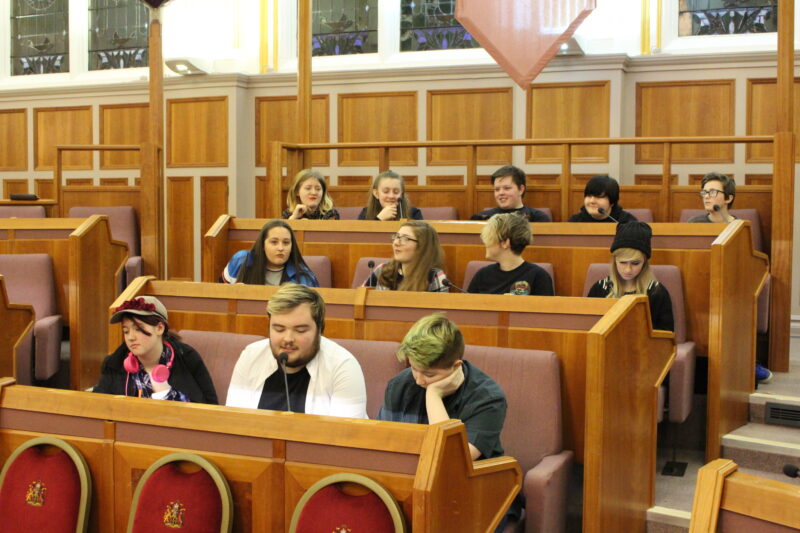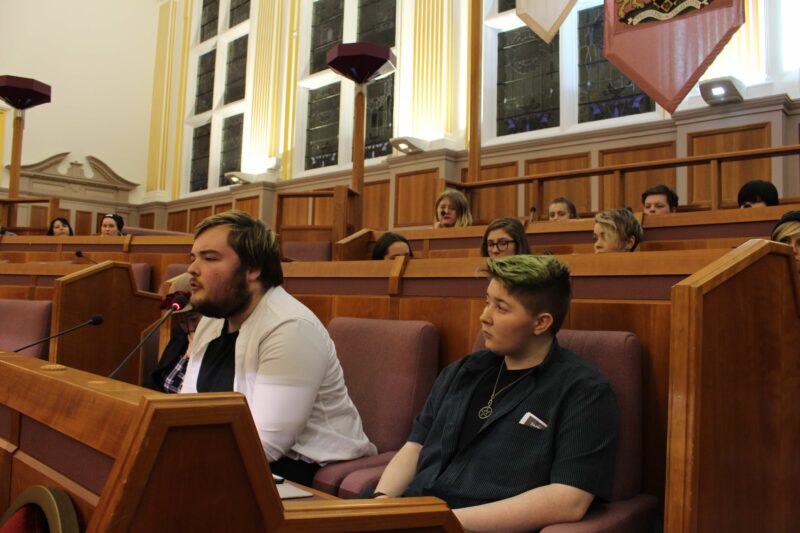



It’s been a really busy time for us! This month is LGBT History Month, and last week was also Hate Crime Awareness Week. For us, these are two important parts of the year. As a bisexual woman, I’ve spoken openly about my experience of biphobia and since 2014 have worked with Contact on hosting a youth debate for Queer Contact. This year we really stepped up our activity; Contact commissioned us to work with five LGBTQ+ youth groups across Greater Manchester before the festival to work in a much more in depth, meaningful way. Alongside those workshops, last week delivered our Equalities Workshops to over 750 Year 8&9 students in schools in Salford and Manchester, as well as speaking at the Hate Crime Awareness Week Launch and hosting the Queer Contact Launch!
Both our equality and debating workshops are discussion based and we like to challenge participants to think of a deed they can pledge to action for themselves. At the moment, with the difficult political climate, committing to larger deeds can feel daunting, but the small deeds can feel like they make little impact. However, if we were to all stick to our small deeds as a collective, then larger impact would be felt. Just as we experienced recently when we joined thousands of others in Manchester on the marches against Trump’s divisive policies.
In the run up to Queer Contact we started to work with 5 LGBT groups to explore the importance of using your voice, being heard, debating and listening. With the main event being during Hate Crime Awareness Week I asked them if they felt that hate crime is rising/are concerned for their safety since Brexit. Across the groups, young people agreed that they felt discrimination was rising. We discussed politics, the spin the media puts on news, our own personal experience of discrimination and how we think we can combat it. We talked about the importance of LGBTQ+ people being visible but also how vulnerable that can make you in certain situations.
All of these conversation with the LGBTQ+ youth groups fed into our work with two academy schools in Manchester and Salford last week. With the importance of visibility at the forefront of my mind, I ‘came out’ to every pupil in all 15 of the sessions.
After exploring equality and inequality both historically and in the world today, I asked if in the UK today, they felt LGBTQ+ people were treated equally in status, rights and opportunities and overwhelmingly students agreed. I then asked all those who knew someone LGBTQ+ to raise their hand, then lower it if that person had faced discrimination or hate crime based on their sexuality or gender identity. In one workshop around 60% of the students knew someone but 100% of them lowered their hands. From there, we started to look at what still needs to happen to erase hate for the LGBTQ+ community and we wrote and shared pledges about what we will do to be allies and support equality.


At Contact’s Queer Youth Gathering I was hosting the first debate of the day. I take this role seriously and always make sure the debate is led by young voices and not adults or the panel. One of the things that really struck me in all of the workshops was how the young people felt like adults didn’t listen to them and often didn’t respect their opinion. They talked about how decisions are often made on their behalf without asking them.
As adults who work with young people, I can’t express how important I think it is to listen rather than speak. Young people often see the world in a much more insightful way than we do. As adults, with the older we get, the smaller our circles become and the more of a bubble we live in, unlike young people who are experiencing new people, communities and ideas sometimes more regularly than we are. I often hear adults telling young people ‘things will be ok in the end – it will get better’ but isn’t there a sense of belittling their experience? Surely it’s better to listen to what they need rather than just telling them what it was like for us; to use our privilege both in societal status to support them and improve things. In the same way that for the LGBTQ+ community, visible cis-gendered and heterosexual advocates are important, so is using our status as adults to share our social power to provide a platform for young people to be listen to.
As part of the workshops with The Proud Trust and B You, here are some of the provocations the young people wanted to discuss and topics they wanted to be heard on, which I wanted to share:
In terms of services, when discussing mental health I lost count of how many times the young people expressed how much they felt like they were being seen as a tick box (or trying to be squeezed into one), rushed through an appointment, bypassed and their parent or carer (who was always present, which many of them stressed they didn’t want) given the focus, and how they felt they weren’t listened to, or treated like they didn’t know themselves, or what they needed.


Listening to these young people, sharing stories and hosting a debate can often lead to a bubble with a lack of external action, so each year I try and focus on some key pledges attendees can stick to. This year at Queer Contact (also informed by our Hate Crime workshops) I have highlighted the key things I am going to try and implement for myself:
If you’re around at Contact during February, please do pop in and watch the film of our work with The Proud Trust and B You made by Andrew Anderson. Grab the headphones and plug in – hopefully you’ll feel as recharged, inspired and galvanised by the young LGBTQ+ young people in Manchester as I am.
If you’re interested to read more about our equalities workshops, the views of young people and the actions they are taking in order to help make equality a reality, click here.
With thanks to our funders Manchester City Council and Salford CVS for their support with our Equalities Workshops and AGMA, Manchester City Council and Contact for their commission and support for our Debating Workshops.
#WeStandTogether
